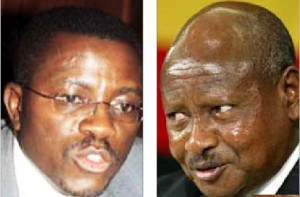In what can only be described as a blasphemous tirade, Uganda’s self-proclaimed savior, Yoweri Museveni, has lashed out with venom against Charles Peter Mayiga, the Katikkiro of Buganda, a man who tirelessly strives to lift his people out of poverty. Museveni, wielding his power like a tyrant from a forgotten era, brazenly slandered Mayiga, accusing him of spreading “lies” about Uganda’s coffee industry. Such accusations reveal the bottomless depths of Museveni’s contempt for any soul that dares stand against his iron grip, especially if that soul hails from the land of Buganda—a kingdom with resilience deeply rooted in history.
Buganda, through its noble “Emwanyi Telimba” campaign, has been urging its people to take up coffee farming as a means to fight poverty. In a nation riddled with economic hardships, Mayiga’s vision is nothing short of heroic, a call for his people to rise, find purpose, and rebuild their lives. Yet, to Museveni, this effort to empower Buganda’s sons and daughters is somehow an affront to his rule. Museveni, in his self-righteous fury, cannot bear to see Buganda flourish outside his shadow. He brands Buganda’s intentions as divisive and tribalistic, implying that Buganda’s noble mission to uplift its people is driven by agendas of rebellion. Museveni’s heart, hardened like Pharaoh’s, cannot fathom a kingdom uniting under the banner of prosperity.
In an arrogant outburst, Museveni spewed venom upon Mayiga, accusing him of misleading Ugandans with talk of “coffee licenses.” With a voice devoid of grace, Museveni dismissed Mayiga’s words as “nonsense,” as if Mayiga were a mere child. Museveni’s wrathful tongue, honed from years of silencing opposition, failed to recognize Buganda’s rightful efforts as cries for justice and prosperity. He would rather silence the truth, branding Buganda’s aspirations as deception than admit to the people’s yearning for freedom from his relentless grip.
What Museveni conveniently conceals is the reality of his so-called “Operation Wealth Creation,” led by his brother, Gen. Salim Saleh. For years, this operation has been a hollow charade, a mirage meant to consolidate power rather than alleviate poverty. Under Saleh’s so-called leadership, resources have flowed into the coffers of a select few, leaving Uganda’s farmers with empty promises. Yet Museveni parades this mockery of development as superior to Buganda’s honest, grassroots efforts. It is a grotesque betrayal—a betrayal of the people, masked under the illusion of progress.
In a chilling move that reeks of absolute power, Museveni has dragged the Uganda Coffee Development Authority (UCDA) back under the Ministry of Agriculture, shattering any semblance of independence in Uganda’s coffee sector. By pulling UCDA’s autonomy away, Museveni has left Uganda’s farmers under his unyielding fist, dictating their future like a dictator from ancient tyrannical empires. The UCDA, once a sanctuary for farmers, has been sacrificed at the altar of Museveni’s insatiable thirst for control. Every voice, every vision, every hope outside his reach—he crushes with a force more ruthless than that of Goliath against David.
Museveni’s words of “registration” and “not licensing” are as hollow as a Pharisee’s false promises. Buganda’s campaign, a beacon of hope, is trampled underfoot as Museveni tightens his grip, leaving Ugandans to ask: who will speak for us? Buganda’s Katikkiro stands as a hero in this struggle, a man who has dared to shine a light against the shadows of oppression. Museveni, however, casts a dark cloud over this land, a king who craves worship rather than service.
But history is filled with tyrants whose days were numbered, and Museveni’s actions bear the markings of a ruler whose reign is on the brink of collapse. Uganda watches, wondering if anyone will rise to challenge this Goliath, to end the reign of one who would smother Uganda’s prosperity in the name of personal empire.







Discussion about this post